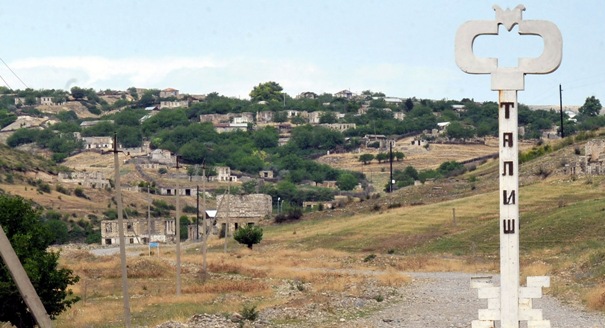In the last few months the almost moribund peace process over Nagorny Karabakh has got back on its feet. Presidents Ilham Aliyev and Serzh Sargsyan met in Vienna in November for the first time in two years. Their foreign ministers are due to hold talks later this month.
This isn't a resumption of full negotiations. The two sides are still apparently stuck in a quasi-theological debate about the importance of the Basic Principles framework document. But it is a start. And U.S. secretary of state John Kerry has let it be known that if Washington sees a serious commitment to substantial talks he is prepared to invest more resources in supporting it.
Underpinning all this has been a commitment to uphold the ceasefire. And by a ceasefire I mean both a real and rhetorical one.
When it comes to the real ceasefire, signed almost 20 years ago in May 1994, 2013 was a relatively good year. Around twenty Armenian and Azerbaijani soldiers were killed along the Line of Contact last year. That is obviously twenty too many—but it was still a marked improvement on recent years.
Then there is the war of rhetoric. This conflict may not be the most explosive in the world, but in recent years the language used by each side (and especially the losing Azerbaijani side) has been unusually aggressive and poisonous.
Probably the most important outcome of the Vienna meeting was that the two leaders pledged to calm their rhetoric. And they have done so (a development that has mostly gone unnoticed by the media, which always finds it hard to report on a non-event).
This makes reports of a clash on the Line of Contact on the night of January 19-20 a cause for concern. It is always hard to verify these episodes. All that we know for one sure is that one Armenian soldier died, and James Warlick, the lead U.S. negotiator expressed his regret.
The Armenian side says a large group of Azerbaijanis made a large incursion across the line. The Azerbaijani defense ministry denied the story.
Armenian experts speculated about an attempt to apply political pressure ahead of the new talks.
In the meantime parts of the media are still conducting themselves well. Earlier this month, the young Azerbaijani chess grandmaster Vugar Gashimov died at the untimely age of 27. Armenian chess-players, led by Baku-born Garry Kasparov, expressed their sympathies. This was not so unusual. What was that the condolences prompted a favorable commentary on a pro-government Azerbaijani website.
On both sides, the signals come from the very top. We can only hope that both ceasefires—of rhetoric and guns—persist into 2014.





